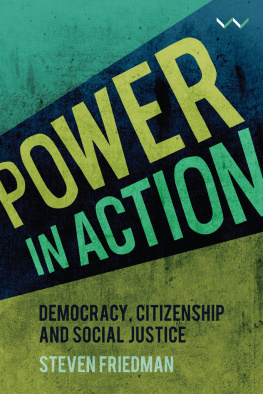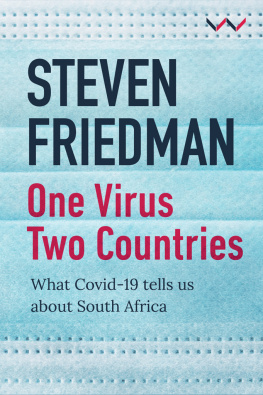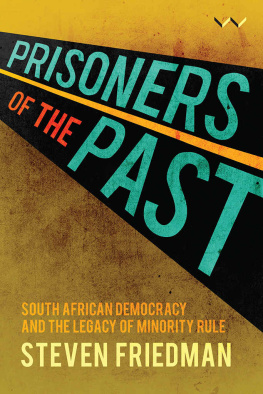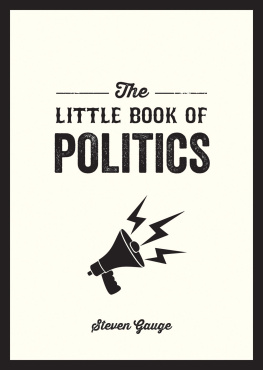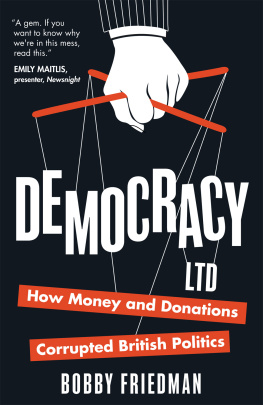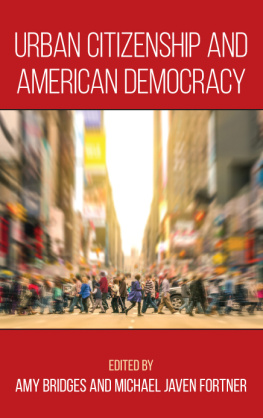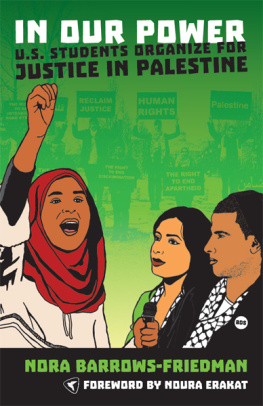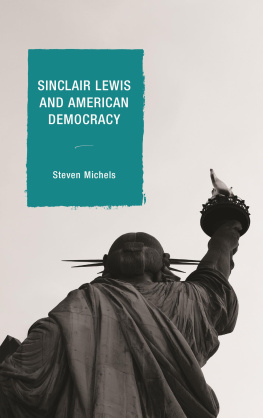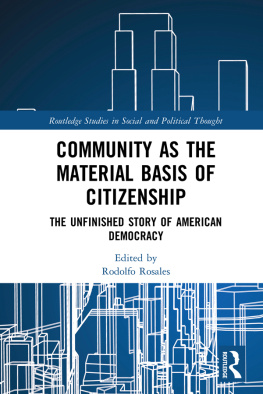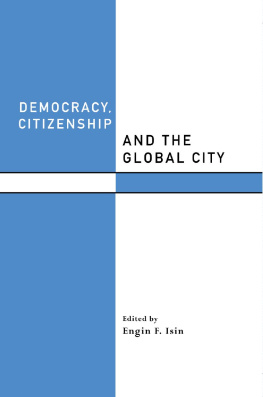Published in South Africa by:
Wits University Press
1 Jan Smuts Avenue
Johannesburg 2001
www.witspress.co.za
Copyright Steven Friedman 2018
Published edition Wits University Press 2018
First published 2018
http://dx.doi.org.10.18772/12018113023
978-1-77614-302-3 (Paperback)
978-1-77614-303-0 (Web PDF)
978-1-77614-304-7 (EPUB)
978-1-77614-305-4 (Mobi)
All rights reserved. No part of this publication may be reproduced, stored in a retrieval system, or transmitted in any form or by any means, electronic, mechanical, photocopying, recording or otherwise, without the written permission of the publisher, except in accordance with the provisions of the Copyright Act, Act 98 of 1978.
Project manager: Elna Harmse
Copyeditor: Margaret Labuschagne
Proofreader: Lisa Compton
Indexer: Marlene Burger
Cover design: Hybrid Creative
Typesetter: Newgen
Typeset in 10 point MinionPro-Regular
INTRODUCTION
Is democracy good for Africans in general and South Africans in particular? Does it really belong to us or is it a Western idea imposed to enslave us? If democracy is both ours and good for us, how do we know a democracy when we see one? And, if we do see one, how do we know whether and how it will survive? How do we do what we can to make it flourish and grow?
A few years ago, it seemed absurd to question democracys value or its survival. Formal democracy, in the shape of regular multi-party elections and at least some of the liberties and rights which are meant to accompany them, was no longer a rarity, practised mostly by rich countries. It had become the norm in Africa and Latin America and had taken root in parts of Asia (which also houses the worlds largest democracy, India). Much of humanity lived in democracies, many of which, only a decade or two ago, were not democratic. Democracy had also become almost hegemonic in the sense that it was considered the normal, common-sense way of arranging politics: with some isolated exceptions, governments which wanted respectability insisted that they were democratic, whatever reality might suggest. In South Africa, formal democracy ended decades of white minority rule and was widely embraced by most citizens. This mirrored the international trend modern people were confirmed democrats and the systems only opponents were small groups of hold-outs on the right and left.
This brief period of democratic triumph is now under threat. In contrast to earlier periods of democratic breakdown the collapse of democracies in Europe in the 1930s
The anxiety is based less on a sense that democracy may be dying, although some claim that it is losing ground, particularly in Africa. preserves democratic form but denies citizens the control over their lives which democracy is meant to offer. The neoliberal rationality they warn against can be understood not only as an economic framework which allows markets rather than elected representatives to govern, but also as a reliance on decisions taken by experts rather than citizens.
Some of the pessimists remain firm democrats, distressed that the system of government which they support may be under pressure. But not all are: some insist that the problem may be democracy itself. Current writings on democracy suggest that the problems the system faces can be addressed only by abandoning the Fukuyaman narrative and instead adopting a position that better appreciates the limits and flaws of this form of rule Still, the uncritical tone of a decade ago has been replaced by reflection on democracys faults as well as its fragility.
South Africa is not immune from doubts about democracys survival or its merits. On the contrary, so widespread are these sentiments that South Africans often seem to believe that their democracy is the only one on the planet whose citizens fear for democracys future or doubt its merits. Anxiety that democracy is doomed is a constant feature of public debate.which established democracy has failed to address racial inequality. These concerns often underpin discussions, in the seminar room or at the kitchen table, and occupy the thoughts of citizens experiencing for the first time the uncharted territory of democratic self-government.
However, whatever democracys fate, the tide of democratic discontent is overstated. First, democracys decline is less pronounced than in previous eras of retreat and off a much higher base. For much of the twentieth century (and most of human history), democracy has been restricted to a few countries, some of which saw no contradiction between extending democratic rights to their citizens while denying them to the Africans and Asians they colonised. Before the current wave of democratisation in Africa began, only two countries, Botswana and Mauritius, maintained working democracies over decades. Despite retreats from democracy in some countries, democracy is far more widespread than at any previous period in Africa and in the rest of the world. And, as serious as the backsliding is, the fact that most countries retain democratic form and insist that they are democratic creates opportunities for citizens to express themselves and hold power to account which are not available in despotic systems. The claim, made 15 years ago, that [t]he democratic idea is close to non-negotiable in todays world is under stress. But it may not be as dated as it seems, given the continued need of governments which do not value democracy to continue operating within its form, and claiming allegiance to its values.
As for the idea that democracy is a Western imposition, perhaps the strongest argument against it is evidence that citizens outside the West want the rights and freedoms which democracy offers. We will return to this evidence, but, for now, we need only note that persistent majorities of African citizens opt for democracy if given the choice. Democracys critics disregard the sustained demand of African peoples amply demonstrated in one Afrobarometer survey after another for democratic polities that promise to help citizens hold those in power accountable. In South Africa, despite disillusion with the bargain of 1994, the voices urging that democracy be rescued from political power-holders far exceed those that want rights and freedoms curbed.
So democracy may be staggering, but it is not about to fall. It may well not only weather its current trials, but emerge from them stronger. Understanding where democracy comes from, what nurtures it and what threatens it remains essential if we wish to chart South Africas future. Nor, despite the necessary end of Fukuyamas triumphalism, is democracy discredited as a system of government capable of realising human freedom. One of apartheids few useful legacies is the determination of the vast majority of citizens to ensure that the country never returns to it, which ensures that democracy is more attractive than it might be to citizens to whom the alternative was being treated as a lesser type of being.
Rejection of democracy in South Africa remains a marginal position because it flies in the face of lived reality. Anyone who has been fortunate enough to live through the transition from apartheid and who does not harbour a longing for white supremacy is now able to speak and act in ways which were not possible then. People who were once crushed under foot by power are now free to develop as thinking and acting individuals able to command the respect they were denied. Politics, that process in which citizens engage in open co-operation, contest and conversation, is now possible in ways which were then precluded. South African democracy, like that of all other countries, is limited and flawed. But it has opened possibilities which were obstructed in the past. And, while the bargain of 1994 did not steer the economy onto a new path which would eliminate the divide between insiders and outsiders,


